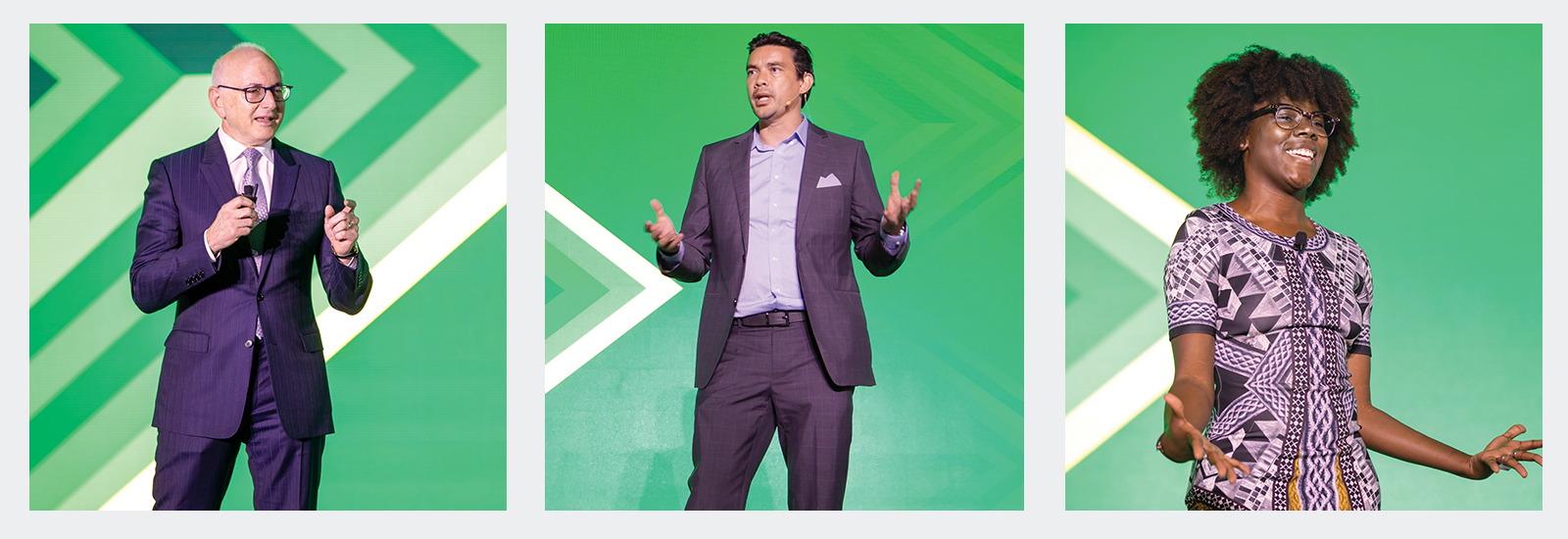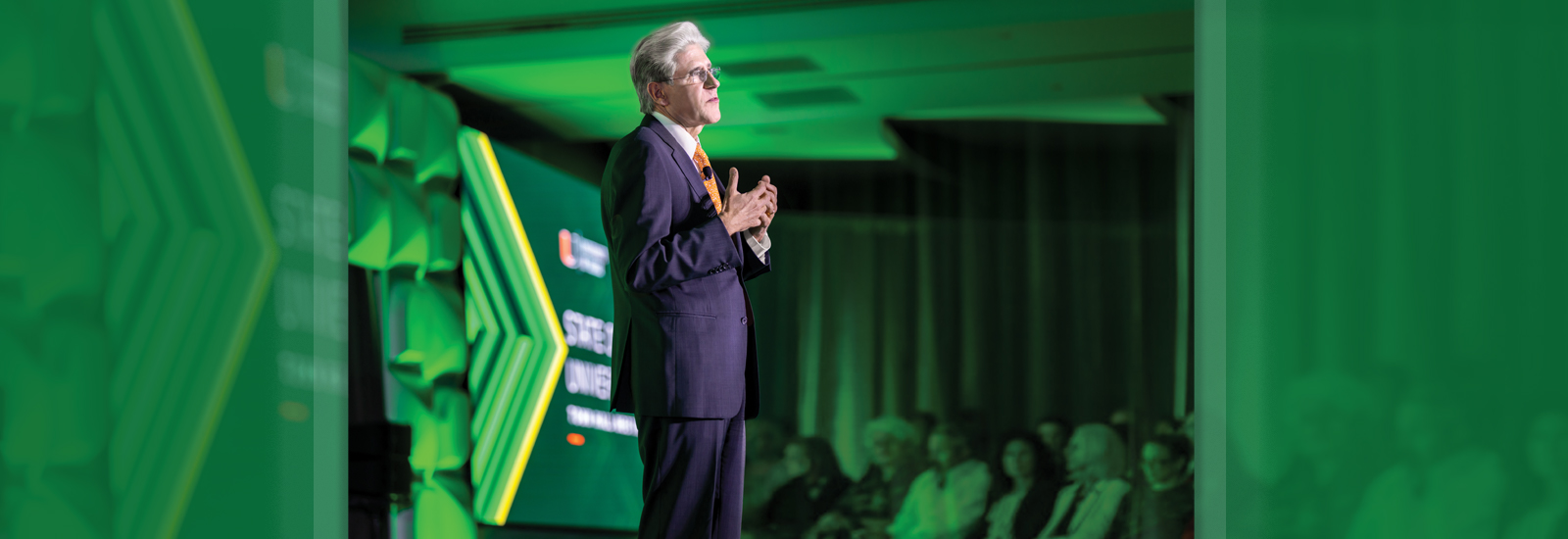by Janette Neuwahl Tannen and Jenny Hudak
“THE UNIVERSITY OF MIAMI EXCELS BECAUSE WE EMBRACE CHANGE, AND THAT CHANGE IS DRIVEN BY PEOPLE WHO REFRESH AND RENEW OUR PURPOSE AND DEDICATION WITH EACH NEW GENERATION.”
University of Miami President Julio Frenk shared this as part of his second State of the University address on Sept. 12 in the Shalala Student Center ballroom, attended by hundreds of faculty, students, staff, and invited guests. The town hall-style event provided examples of how the University is implementing goals outlined in the Roadmap to Our New Century, the ambitious strategic plan that is making academic advances in a number of areas as the University approaches its centennial in 2025. Everyone in the University community, Frenk noted, is moving the institution forward.
This is a collective effort,” Frenk added. “I am president of the University and accountable for everything that happens at this University, but all the good things that happen are the product of all the people here.
One of the Roadmap’s initiatives to foster interdisciplinary research is being addressed by U-LINK, or the University’s Laboratory for Integrative Knowledge. This effort supports collaborative research teams from multiple disciplines tackling important societal problems. One of the teams, Project Hurakan, is working to improve the communication of hurricane forecasts for vulnerable populations and recently produced an interactive news piece that was featured in The New York Times.
Frenk also noted that the University continues to be a leader in studying the impacts of climate change, which was touched upon earlier in the evening in a talk by Andrew Baker, associate professor of marine biology at the Rosenstiel School of Marine and Atmospheric Science. Baker discussed how rising temperatures are threatening the survival of coral reefs, which he called the “rainforests of the sea” due to their rich biodiversity.
“We are literally ground zero for the most significant threat not only to our city, but to the entire planet—climate change,” Frenk noted. “The University of Miami is equipped to confront this complex issue in ways that few other institutions can.”
One way the University will do this is through the Miami Climate Symposium planned for January 2020 that will “showcase our institutional commitment to reduce risks of weather- and climate-related disasters,” Frenk added.
In addition to Baker, other speakers who took the stage before Frenk delivered the keynote address included Stephen Nimer, director of Sylvester Comprehensive Cancer Center, part of the University’s Miller School of Medicine, and Sade Prithwie, a senior majoring in human and social development and Spanish.
Nimer highlighted how Sylvester, which in July received the prestigious NCI designation from the National Cancer Institute, is working tirelessly to advance the understanding of cancer and find new and more effective treatments.
“We are humbled by our success and inspired by the possibilities ahead,” said Nimer.

Prithwie talked about the instant comfort she felt when she first stepped onto campus as a first-year student and the connections she has made along the way. Those connections, and her opportunities to pursue research, have all helped to define her.
“I didn’t have a dream school,” Prithwie shared. “But through my experiences and the people I have met along the way, the University of Miami is definitely a dream come true.”
During Frenk’s address, he emphasized the University’s commitment to research and its ongoing efforts establishing a series of institutes in the science, technology, engineering, and mathematics fields. The first, called the Frost Institute of Chemistry and Molecular Science, will be housed in a new building that is currently in the design process, and the Institute of the Mathematical Sciences of the Americas was founded this past summer.
Frenk described the University’s effort to extend its hemispheric footprint by forging partnerships with universities and institutions throughout the Caribbean and Central and South America. The first of its five “hubs,” or satellite offices, opened in Mexico last May to nurture these relationships.
In its classrooms, Frenk explained, the University is taking advantage of new technology and professional development to train students and professors for the future. A new program called PETAL, for the Platform for Excellence in Teaching and Learning, provides innovative resources to support newly hired faculty, and NextGen MD is changing the medical school’s curriculum to emphasize patient-centered learning in teams, as well as population health.
“Lectures aren’t bad. Bad lectures are bad,” Frenk offered to some laughs from students. “It is my personal goal to eradicate them from this campus.”
Frenk also highlighted the University’s relationship with the Plantation, Florida-based company Magic Leap and its mixed-reality platform, which allows users to interact with the virtual and physical world simultaneously using special Magic Leap glasses. A collaboration this summer between the Center for Computational Science and Magic Leap produced “The U Experience,” an interactive map of the Coral Gables campus, with geo references for every tree. The technology is available in the Otto G. Richter Library’s new Magic Leap Lab.
Students said they enjoyed the event, especially hearing from not just Frenk but from a panel of senior leadership that included Jeffrey Duerk, executive vice president for academic affairs and provost; Jacqueline A. Travisano, executive vice president for business and finance and chief operating officer; and Edward Abraham, executive vice president for health affairs and chief executive officer of UHealth; and was moderated by longtime NBC television anchor Tony Segreto.
Emily Gossett, Student Government president and senior communication studies and sociology major, echoed what a number of students shared: Educational improvements and efforts to transform the learning process are happening on campus.
“They say that we are such different learners than their generation was as learners, and I think that’s really true and speaks a lot to the fact that faculty really, really do try to understand students and that our administration really does look out for students,” Gossett noted.





